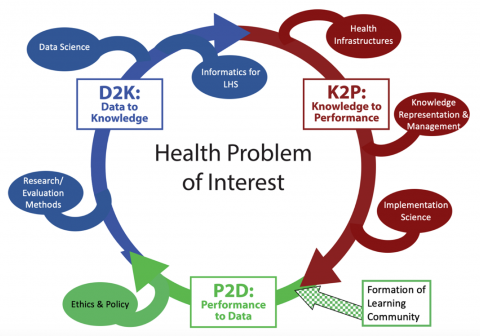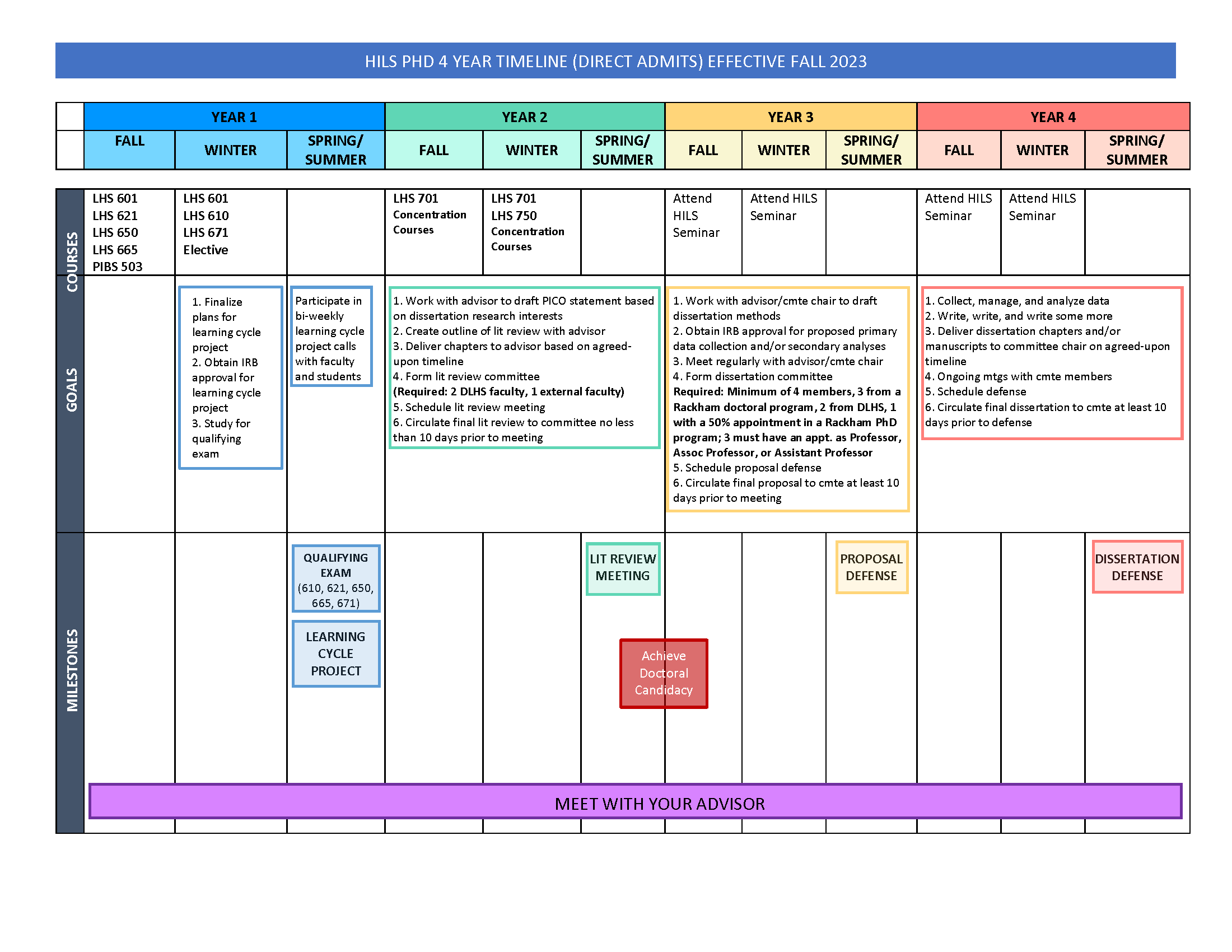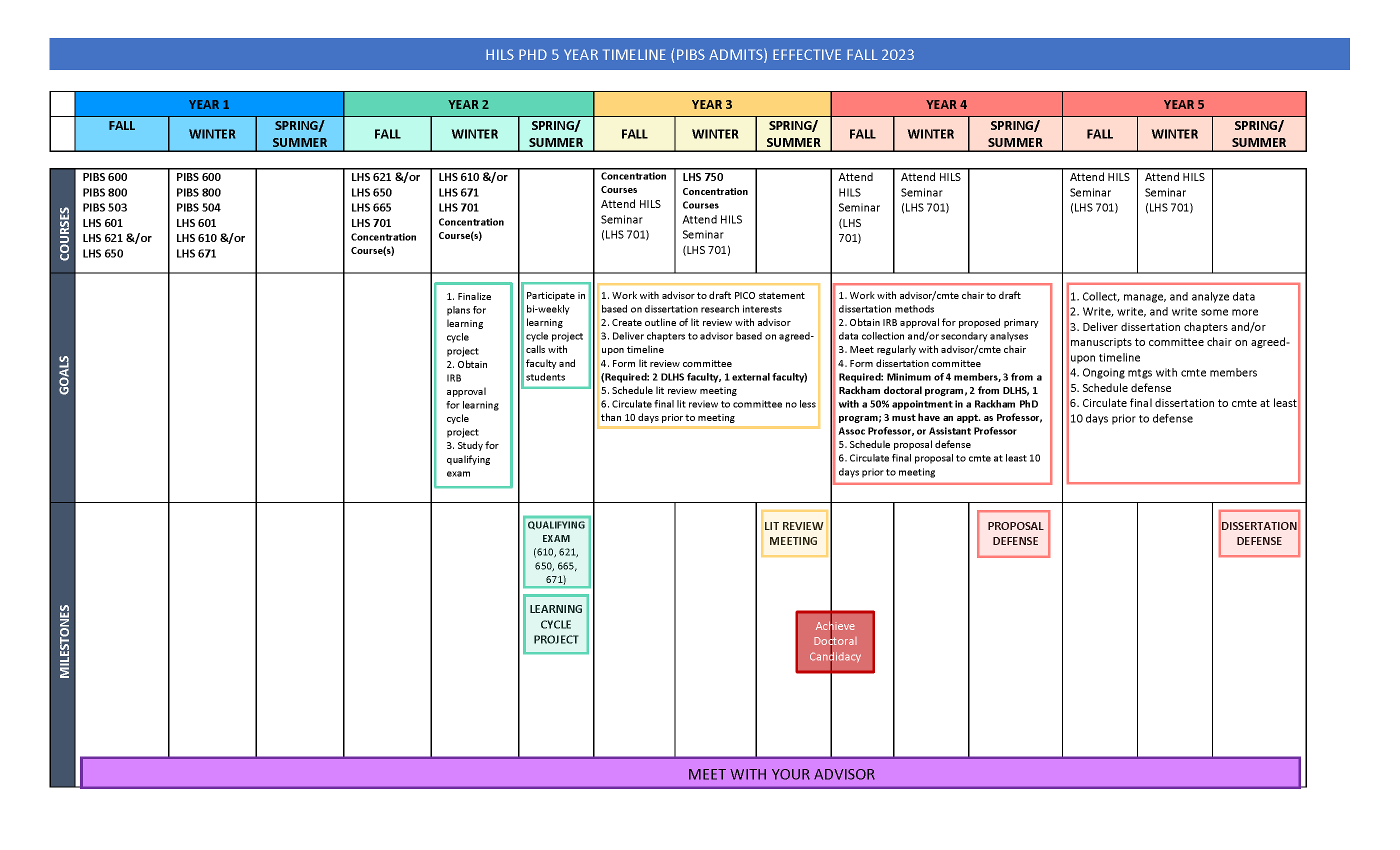Interdisciplinary Learning Sciences Curriculum
The HILS learning sciences curriculum emphasizes the role of learning in health care environments and the tools needed to facilitate systems change. HILS introduces distinct models of adaptive change, and students apply their skills immediately to existing problems.

Defining characteristics include:
- Nature of health information
- Role of information technology and informatics
- Translation of biomedical research knowledge into clinical practice or consumer advice
- Complex organizational, social, and regulatory environment in which learning in the health sciences takes place
Degrees
Master of Science
Whether online or residential, MS students will complete a minimum of 27 credits. The MS program is intentionally designed to be about a year of study, to appeal to professional students (both clinicians and engineers, among others) who wish to gain new knowledge and skills in a short, intensive program.
Doctor of Philosophy
PhD students will complete a minimum of 36 credits of coursework. Doctoral students will begin the dissertation proposal during winter term of their second year. Working closely with their advisor and planning committee, they will draft a proposal for their dissertation and a public proposal defense will be conducted. The dissertation research phase of the program is likely to be variable across candidates. On average, we expect students to complete their research within three years of the proposal defense. Students will defend their dissertations through a public examination by their PhD committees.
Beginning in Fall 2023, HILS PhD students may choose to add a concentration in implementation science or informatics, or a concentration of their own design. Course information is here.
Courses
Four types of courses are required for all students in the MS and PhD programs:
- Research methods course(s),
- Courses in the components of the learning cycle,
- Courses in health infrastructures, as well as
- At least two elective courses suited to the student’s area of scholarship for MS students or
- At least one cognate and one elective course, plus two advanced research methods courses for PhD students.
Students are thoroughly grounded in each of the phases of the learning cycle and to the infrastructure required to enable the learning cycles to function in a learning health system. The health infrastructures courses bookmark the learning cycle sequence, ensuring that students gain an initial understanding of the concepts and approaches to building and maintaining health infrastructure, with opportunities to apply and experience actual creation and maintenance activities. The cognate requirement is intended to foster intellectual breadth, which, due to the highly interdisciplinary nature of the HILS program, will be inherent in the courses required of and elected by students.
Initial MS and PhD courses in HILS are open to admitted degree-seeking students and others with an interest. Students who are not in the HILS program should consult with the program advisor in their home department to determine how HILS courses might suit their program of study and degree requirements.
For more information, read the course descriptions.
Courses within Learning Health Sciences
- LHS 601: Professional Development Seminar (1 credit)
- LHS 610: Exploratory Data Analysis for Health (3 credits)
- LHS 611: Knowledge Representation and Management in Health (3 credits)
- LHS 621: Implementation Science in Health 1 (3 credits)
- LHS 622: Learning Cycle Capstone (3 credits)
- LHS 631: Learning Analytics: Foundations and Applications (3 credits)
- LHS 641: Quality Improvement in Healthcare Systems (3 credits)
- LHS 650: Health Infrastructures Pro Seminar 1 (3 credits)
- LHS 660: Evaluation and Research Methods for Health Informatics and Learning Systems (3 credits)
- LHS 665: Applied Biostatistics for Health Researchers (3 credits)
- LHS 671: Ethics and Policy Issues for Learning Health Systems (3 credits)
- LHS 680: Teamwork in Healthcare (3 credits)
- LHS 701: Research Seminar (1 credit)
- LHS 712: Natural Language Processing on Health Data (3 credits)
- LHS 721: Implementation Science in Health 2 (3 credits)
- LHS 731: Special Topics in LHS (credits vary by semester)
- LHS 750: Health Infrastructures Pro Seminar 2 (3 credits)
- LHS 760: Foundations of Qualitative Methods (3 credits)
Courses in Coordination with Other Departments
- SI 542: Introduction to Health Informatics (3 credits)
- Advanced/Applied Research Methods
- Quantitative Analysis/Statistics
Electives
Electives will be determined individually by students together with their advisors. One elective suited to the student’s area of scholarship is required. A current elective offered by HILS faculty is Natural Language Processing on Health Data. Other electives are being planned for the future.
In addition, the HILS program faculty have identified more than 75 potential elective courses across a wide range of research areas at the University of Michigan: biostatistics, public health and policy, ethics, health management, women's studies, nursing, industrial and organizational engineering, epidemiology, social work, and more.
Applied Practice and In-Depth Research
For PhD Students
A learning cycle project (examples), completed following the first year of the PhD program, provides students with an opportunity to apply their knowledge and skills. Most students will work with faculty on projects related to their focal area. A student interested in learning implementation and behavior change skills may work with a faculty member involved in implementing guideline-concordant care for low-income patients with diabetes in community settings. Doctoral students begin the dissertation proposal early on. Working closely with their advisor and planning committee, they draft a proposal for their dissertation, following guidelines for nationally-funded research applications.
For MS students
A learning cycle project (examples) is completed either during a student’s final semester of the MS program or it can be completed earlier in a student’s program with advisor approval. The LCP provides students with an opportunity to apply the knowledge and skills gained throughout the HILS MS courses, to a real-world project. Students will work with their faculty advisors and learning cycle project site supervisors on projects related to their areas of interest. For example, if a student is interested in analyzing EHR data for their learning cycle project, they will work with their faculty advisors and site supervisors to acquire, manage, and analyze data.
Health Infrastructures and Learning Systems Course Sequences
Master of Science
*The MS program can be completed in 12 months by completing all the courses in Year 1 or in 20 months by completing the courses in both Year 1 and 2.


PhD Degree

PIBS PhD Timeline
Dissertations
2023
2022
2021
2020


